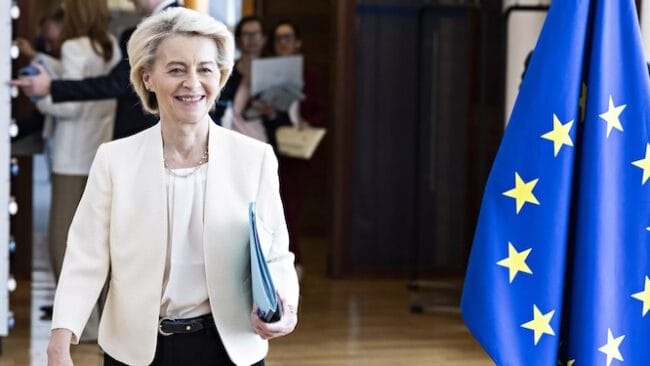The new budget will be more flexible to cope with unforeseen crises.
Ursula von der Leyen has unveiled her much-anticipated proposal for the new budget of the European Union, worth €2 trillion between 2028 and 2034, a sizable increase compared to the €1.21 trillion approved by leaders in the summer of 2020.
“It’s a budget for a new era that matches Europe’s ambition,” the president of the European Commission said on Wednesday afternoon.
“That addresses Europe’s challenges. That strengthens our independence.”
Her blueprint remodels the budget’s structure along three main pillars.
- €865 billion for agricultural, fisheries, cohesion and social policy.
- €410 billion for competitiveness, including research and innovation.
- €200 for external action, including €100 billion for Ukraine.
All the financial envelopes will be made conditional on compliance with the rule of law, a key change in reaction to democratic backsliding in Hungary.
“The rule of law is a must,” von der Leyen said. “We will ensure responsible spending and full accountability.”
Wednesday’s presentation officially kicks off a political squabble between member states and the European Parliament, expected to be protracted, gruelling and explosive, as each constituency fights tooth and nail to secure money for its priorities.
Von der Leyen’s proposal for the new multi-annual budget is strongly shaped by the experience of her first mandate at the top of the powerful executive.
Shortly after she arrived in Brussels, a largely unknown figure plucked from Berlin, von der Leyen was faced with the COVID-19 pandemic, which forced her to design a new recovery fund, repair supply chains and negotiate vaccine contracts on behalf of the 27 member states. She was then tasked with navigating the consequences of Russia’s full-scale invasion of Ukraine, the spike in energy prices, record-breaking inflation, fierce competition from China and a string of devastating natural disasters.
The sweeping tariffs of US President Donald Trump are the latest chapter in a series of back-to-back crises that have put the bloc’s finances under unprecedented strain, seriously challenging the collective ability to respond to unforeseen events.
Mindful of these constraints, von der Leyen has reformed the long-term budget to make it less rigid and more flexible, giving her services greater room for manoeuvre to deploy money according to the ever-changing circumstances inside and outside Europe.
“It’s strategic, more flexible and more transparent,” she said, calling it the most “ambitious” ever proposed by the executive.
The strategy represents an ambitious departure from the traditional thinking underpinning the budget, formally known as the Multiannual Financial Framework (MFF), which until now has been based on clearly defined allocations for specific programmes managed by the European Commission’s specialised departments.
